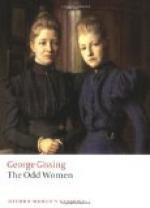But it was time that chance favoured him, and his interview with Miss Nunn came about in a way he could not have foreseen.
At the end of the first week of January he was invited to dine at Miss Barfoot’s. The afternoon had been foggy, and when he set forth there seemed to be some likelihood of a plague of choking darkness such as would obstruct traffic. As usual, he went by train to Sloane Square, purposing (for it was dry under foot, and he could not disregard small economies) to walk the short distance from there to Queen’s Road. On coming out from the station he found the fog so dense that it was doubtful whether he could reach his journey’s end. Cabs were not to be had; he must either explore the gloom, with risk of getting nowhere at all, or give it up and take a train back. But he longed too ardently for the sight of Rhoda to abandon his evening without an effort. Having with difficulty made his way into King’s Road, he found progress easier on account of the shop illuminations; the fog, however, was growing every moment more fearsome, and when he had to turn out of the highway his case appeared desperate. Literally he groped along, feeling the fronts of the houses. As under ordinary circumstances he would have had only just time enough to reach his cousin’s punctually, he must be very late: perhaps they would conclude that he had not ventured out on such a night, and were already dining without him. No matter; as well go one way as another now. After abandoning hope several times, and all but asphyxiated, he found by inquiry of a man with whom he collided that he was actually within a few doors of his destination. Another effort and he rang a joyous peal at the bell.
A mistake. It was the wrong house, and he had to go two doors farther on.
This time he procured admittance to the familiar little hall. The servant smiled at him, but said nothing. He was led to the drawing-room, and there found Rhoda Nunn alone. This fact did not so much surprise him as Rhoda’s appearance. For the first time since he had known her, her dress was not uniform black; she wore a red silk blouse with a black skirt, and so admirable was the effect of this costume that he scarcely refrained from a delighted exclamation.
Some concern was visible in her face.
‘I am sorry to say,’ were her first words, ’that Miss Barfoot will not be here in time for dinner. She went to Faversham this morning, and ought to have been back about half-past seven. But a telegram came some time ago. A thick fog caused her to miss the train, and the next doesn’t reach Victoria till ten minutes past ten.’
It was now half-past eight; dinner had been appointed for the hour. Barfoot explained his lateness in arriving.
‘Is it so bad as that? I didn’t know.’
The situation embarrassed both of them. Barfoot suspected a hope on Miss Nunn’s part that he would relieve her of his company, but, even had there been no external hindrance, he could not have relinquished the happy occasion. To use frankness was best.




